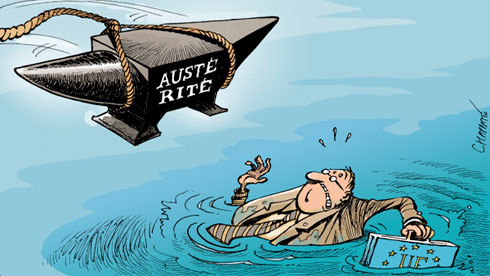The European press blames the economic shrinkage on austerity policies that prevail in most single currency states, with some newspapers advocating a change of course.
“The eurozone has become a recession zone,” remarks La Tribune, which wonders on its front page, if “Europe has been sickened by austerity.” For the French business daily, the figures that were published on February 14 amount to a “Saint Valentine’s Day massacre” —

The latest quarterly report of a 0.6 per cent decline in the wealth of the eurozone is the biggest slump since 1995 — in other words, since Eurostat began to keep statistics on the economic and monetary union.
Receive the best of European journalism straight to your inbox every Thursday
In Portugal, the front page of Diário Económico points out that Portugal, which has endured a 3.2 per cent drop in GDP “is in the throes of the worst recession since 1975.” The latest decline, which is more severe than the one predicted by the government will mean that Lisbon will have to revise its forecasts for 2013. According to experts consulted by the daily, shrinkage will exceed the expected level of 1 per cent. In its editorial, Diário Económico adds that —

Alarm signals in such a large number of countries will, of course, oblige European politicians to take action to alleviate the burden weighing on Portugal, Ireland and Greece. And in Portugal, politicians will also be forced to accelerate economic recovery.
In the Netherlands, NRC Handelsblad reports that the “economy has fallen into its third recession,” since the onset of the debt crisis in 2008. The newspaper argues that the figures have called into question the austerity policies imposed by Prime Minister Mark Rutte. Having blamed the decline in economic activity on a reduction in state investment, it suggests an alternative —

Attempts are being made to convince Brussels to adopt a more flexible budgetary attitude in view of the disappointing economic results throughout the eurozone.
In Spain, La Vanguardia headlines on the “Worsening recession in the eurozone as the year concludes with a 0.6 per cent drop”. The newspaper worries that the situation will only contribute to the problem of confidence with regard to the debt of the most vulnerable states, like Spain, and adds that —

the austerity strategy guided by [German] Chancellor Merkel is no longer effective. Sooner or later, there will have to be change of course. [...] As much as the air it breathes, Europe needs an economic policy that is focused on growth.
Hard times in the eurozone also have an impact on countries that are not in the single currency. In the Czech Republic, Hospodářské noviny headlines: “Czech state sinks into longest recession in history.” In the course of last year, GDP declined by an overall 1.1 per cent, notes the daily. “Among the principal causes of the economic slowdown,” remarks the newspaper, “is a fall-off in household consumption, which is down by 3 per cent over 2011.” Among its consequences —

the disappearance of the traditional economic relationship with our German neighbours. The theory which states that when Germany does well the Czech Republic does even better is no longer valid. The two economies are headed in different directions. The German economy has expanded by 0.7 per cent, while the Czech Republic’s has contracted by 1.1 per cent.
“End of a fairy tale: economy goes into freefall,” headlines,Népszava in Budapest. The newspaper is referring to remarks made by the Hungarian Minister of National Economy, György Matolcsy, in 2012 to the effect that “the Hungarian fairy tale, or the Hungarian example will be successful within a year.” In fact, the Hungarian economy contracted by a total of 1.7 per cent in the course of 2012, whereas in 2011 the country reported growth of 1.6 per cent, following on from 1.3 percent growth in the previous year. The daily notes that —

The economic recession in Hungary is the fourth worst in Europe exceeded only by Greece, Portugal and Cyprus
“The effects of the austerity policies imposed across Europe are as expected,” concludes Mediapart. However, the French news website adds —

Daring attempts to discuss the overvaluing of the European currency, which has wiped out all the efforts made by European countries to relaunch their economies, remain taboo — a fact that will no doubt be borne out by the proceedings of the next G20, scheduled to take place in Moscow at the end of next week. For the European Commission, which is aligned with the position adopted by Berlin, all that will be required to see the benefits of austerity is a willingness to remain patient.
Was this article useful? If so we are delighted!
It is freely available because we believe that the right to free and independent information is essential for democracy. But this right is not guaranteed forever, and independence comes at a cost. We need your support in order to continue publishing independent, multilingual news for all Europeans.
Discover our subscription offers and their exclusive benefits and become a member of our community now!












